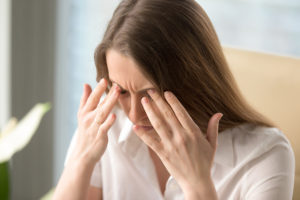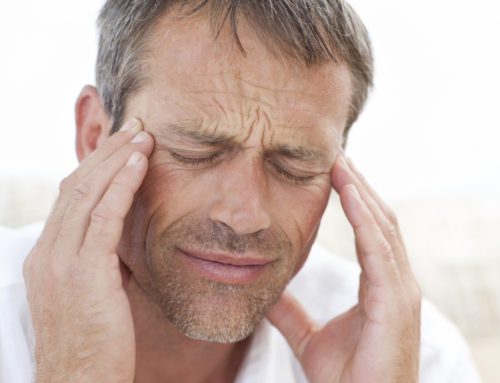
Vertigo can sometimes be called dizziness. But it is important to understand these are two different conditions. Dizziness is more of a feeling of lightheadedness. Vertigo is the sensation that you or the things around you are spinning. It always has a rotational component to it. It is often accompanied by nausea and vomiting, sweating, and ringing in the ears. Vertigo is seen in about 40 percent of people over the age of 40 at least once during their lifetime. Vertigo episodes can range from mild and annoying to serious and disabling. Let’s take a look at some interesting facts about vertigo and dizziness and then talk about what can be done if you suffer from this condition.
Facts About Vertigo
Vertigo may be due to an inner ear problem: BPPV (benign paroxysmal positional vertigo) is one of the most shocking reasons for vertigo. The inner ear contains calcium and protein-based crystals called otoconia. If these crystals become dislodged and float into the inner ear’s canal they can throw off your balance and cause you to experience a brief spinning sensation. This is a mechanical problem and should not be cared for by medication or surgery. Rather, physical therapy or practicing the Epley maneuver is appropriate.
Even though BPPV is the most common condition related to the inner ear, it is still very rare. It affects only 1 out of every 1,000 people every year. It is mostly seen in older adults. It may be connected to physical trauma, inner ear infections, migraines, osteoporosis, and diabetes. Half of the people that see it go away will see it come back again in the next 5 years.
The balance system in the ears also controls blood flow: The blood flow of the body had to do with how well the inner-ear balance system is functioning. The inner ear also has the ability to know when the body is upright. Therefore, when you move from a lying down position to standing up, two of the structures of the inner ear (the utricle and saccule) detect gravity. They relay the message to the cardiovascular system so it can begin to direct blood flow to the change in your position. If this process does not work properly, vertigo or dizziness can be the end result.
If you are low in vitamin B12, you may have vertigo or dizziness: This is a vital nutrient that, if lacking, can cause neurological issues, such as feeling off balance, experiencing low blood pressure, and decreased blood flow to the brain. It is often an overlooked reason for dizziness. You can ask your doctor to check your B12 levels. Also, be sure you are getting enough meat, dairy, and fortified breakfast cereal.
To learn more about the connection between head and neck injuries and vertigo download our complimentary e-book by clicking the image below.
Heart disease can bring on dizziness: Moving suddenly or getting up too fast from a sitting position or from bed can cause you to feel dizzy. However, dizziness can sometimes be connected to a heart condition. This can be caused by leaking or narrowing heart valves, arrhythmias, and atherosclerosis. The reason for dizziness has to do with the reduced flow of blood to the brain.
Migraines can cause vertigo: Some people are shocked to learn that migraines are linked to vertigo. This can occur with or without head pain. Other symptoms of migraine-related vertigo are sensitivity to movement, light, and sound. As many as 40 percent of those with migraines have vertigo.
Dizziness may be brought about by anxiety: Many people who have dizziness, particularly if they are in their 20’s, may also have anxiety issues. This is not something they are making up. The brain’s function can be disturbed if you are experiencing anxiety, and there may be a genetic factor to it.
When comparing people with anxiety to those without, the first group tends to sway more when they see a moving visual environment. These people may be abnormally sensitive to visual stimuli as their dizziness often increases when watching movies or walking in bright lights. It is referred to as visual dependence, and very little is understood about it.
Your eating habits or dehydration can cause dizziness and vertigo: Even very mild dehydration can bring on dizziness. This causes your blood pressure to drop and can lead to dizzy spells. Diets often cause dehydration and lead to dizziness.
Finding a Natural Way to Care for Dizziness and Vertigo
It is possible that your dizziness and vertigo are related to a misaligned bone in the top of the neck, particularly the C1 and C2 vertebrae. These bones were designed to act as a protection for the delicate brainstem, part of the central nervous system. If they become misaligned due to trauma or injury, they can put the brainstem under stress, causing it to send improper signals to the brain. If the brainstem tells the brain the body is in a certain position, when it is not, vertigo and dizziness can be the end result.
Studies have proven that by realigning the bones of the upper cervical spine vertigo and dizziness can be reduced or even go away. A recent study observed 60 vertigo patients. They were all found to have a misaligned bone in their neck. They were given upper cervical chiropractic care specific to their needs. Out of the 60 patients, 48 reported being totally symptom free after a few months. The rest reported seeing an improvement in their symptoms of vertigo.
Here at Thrive Chiropractic in Waynesville, Ohio, we use a gentle method to encourage the bones of the neck to move back into place without the need to pop or crack the spine. This helps the bones realign naturally and leads to healing. Vertigo often improves or becomes a thing of the past.
To schedule a complimentary consultation call our Waynesville, OH office at 513-897-0117 You can also click the button below.
if you are outside of the local area you can find an Upper Cervical Doctor near you at www.uppercervicalawareness.com.







